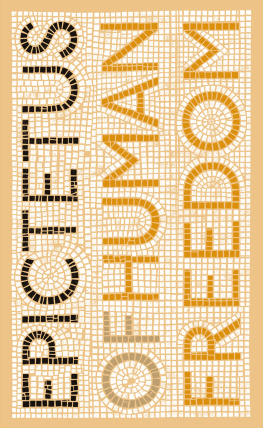Cicero
10643 BC
Cicero
An Attack on an Enemy of Freedom
TRANSLATED BY
MICHAEL GRANT
PENGUIN BOOKS GREAT IDEAS
PENGUIN BOOKS
Published by the Penguin Group
Penguin Books Ltd, 80 Strand, London WC2R 0RL , England
Penguin Group (USA) Inc., 375 Hudson Street, New York, New York 10014, USA
Penguin Group (Canada), 10 Alcorn Avenue, Toronto, Ontario, Canada M4V 3B2 (a division of Pearson Penguin Canada Inc.)
Penguin Ireland, 25 St Stephens Green, Dublin 2, Ireland (a division of Penguin Books Ltd)
Penguin Group (Australia), 250 Camberwell Road, Camberwell, Victoria 3124, Australia (a division of Pearson Australia Group Pty Ltd)
Penguin Books India Pvt Ltd, 11 Community Centre, Panchsheel Park, New Delhi 110 017, India
Penguin Group (NZ), cnr Airborne and Rosedale Roads, Albany, Auckland 1310, New Zealand (a division of Pearson New Zealand Ltd)
Penguin Books (South Africa) (Pty) Ltd, 24 Sturdee Avenue, Rosebank 2196, South Africa
Penguin Books Ltd, Registered Offices: 80 Strand, London WC2R 0RL , England
www.penguin.com
Selected Works first published in Penguin Classics 1960
Selected Political Speeches first published in Penguin Classics 1969
These extracts published in Penguin Books 2005
Translation copyright Michael Grant/Michael Grant Publications Ltd, 1960, 1969
Taken from the Penguin Classics editions Selected Works and Selected Political Speeches, translated and edited by Michael Grant
Except in the United States of America, this book is sold subject to the condition that it shall not, by way of trade or otherwise, be lent, re-sold, hired out, or otherwise circulated without the publishers prior consent in any form of binding or cover other than that in which it is published and without a similar condition including this condition being imposed on the subsequent purchaser
ISBN: 978-0-14-196544-4
The First Philippic against Mark Antony
Senators, before I offer the views on the political situation which the circumstances seem to me to demand, I will briefly indicate to you the reasons, first why I left Rome, and then why I turned back again.
As long as it still seemed possible to hope that you had resumed your control and authority over the government, I felt determined, as consul and Senator, to remain at my post. And so, from the day when we were summoned to meet in the Temple of Tellus, I made no journeys and never lifted my eyes from public affairs. In that temple I did all that was within my power to lay the foundations of peace. I reminded members of the ancient precedent created by the Athenians making use in my oration of the Greek term which that state then employed to calm down civil strife and I moved that every memory of our internal discords should be effaced in everlasting oblivion.
Mark Antony made a fine speech on that day, and his intentions were excellent. It was, indeed, he and his children who made it possible for peace to be established with the greatest of our fellow-citizens. What followed was in harmony with these beginnings. He held consultations on the national situation at his home, and invited the political leaders to attend. He offered admirable recommendations to the Senate. At that stage nothing was disinterred from Gaius Caesars notebooks except matters that were generally known already. In his reply to every question Antony was completely direct. Were any exiles recalled? One, he said, and nobody else. Were any tax-exemptions granted? None, he replied. He even wanted us to accept the proposal of the illustrious Servius Sulpicius that no announcement should be posted of any decree or favour attributed to Caesar which had originated subsequently to the Ides of March. Of the many other excellent measures of Mark Antony I will say nothing, because I want to pass immediately to one particular admirable step that he took. The dictatorship, which had come to usurp virtually monarchical powers, was completely eliminated from the Roman constitution by his agency; we did not even debate the question. He brought us a draft of the decree he wanted the Senate to adopt, and when this was read out we accepted his proposal with the utmost enthusiasm, and passed a highly complimentary vote of thanks in his honour. The prospect ahead of us now seemed brilliant. For we had won liberation from the tyranny under which we had been labouring and, what is more, from all fears of similar tyranny in the future. Although there had often been legitimate dictators in the past, men could not forget the perpetual dictatorship of recent times, and by abolishing the entire office Mark Antony gave the state a mighty proof that he wanted our country to be free.
And then again, only a few days later, the Senate was delivered from the peril of a massacre when the runaway slave who had appropriated the name of Marius was executed and dragged away on a hook. All these deeds were performed jointly with his colleague; other things, later, were done by Dolabella alone, but I am sure that if his colleague had not been away these also would have been matters for collaboration. For during this period a most pernicious trouble was insinuating itself into the city and gaining strength day by day. The same men who had organized that travesty of a burial were now building a funeral monument in the Forum. Every day an increasing number of ruffians, together with their equally degraded slaves, menaced the dwellings and temples of the city with destruction. But these impudent criminal slaves, and their loathsome and infamous counterparts who were free, met their deserts from Dolabella when he pulled that accursed column down. So determined was his action that I am amazed by the contrast between that day and all the others which have followed.
For by the first of June, the date fixed for our meeting, you can see how everything had been transformed. Nothing was any longer done through the Senate, many significant measures were passed through the Assembly of the people and others, what is more, without even consulting the Assembly, and against its wishes. The consuls elect declared they did not dare come into the Senate at all. The liberators of our country, too, were excluded from the very city which they had rescued from servitude though the consuls simultaneously kept on praising them at public meetings and in private talk. Moreover, ex-soldiers claiming veteran rights, on whose behalf this Senate had shown great solicitude, were being egged on to cherish hopes of new plunder in addition to what they already possessed.
I came to the conclusion it was less disagreeable to hear of these things than to see them for myself; and, besides, I was entitled to go travelling on a special mission. This being so, I left Rome with the intention of being back by the first of the following January which seemed the earliest likely date for a meeting of this body.
And so those, Senators, were the circumstances which prompted my departure. I will now indicate briefly the motives behind my return which no doubt gives greater cause for surprise. After avoiding Brundisium and the usual route to Greece as it was only sensible to do I arrived on the first of August at Syracuse, since the crossing from there to Greece was well spoken of. But although I was associated with that city by the closest ties, I could not allow it to detain me for more than a single night, despite its desire to do so, because I was afraid that my sudden arrival among my friends there might arouse suspicion if I lingered. And so I proceeded with a fair wind to Leucopetra, which is a promontory in the district of Rhegium, and there I embarked to cross over to Greece.
But I had not gone very far when a southerly gale blew me back to my embarkation point. It was the middle of the night, and I stopped at the house of my friend and associate Publius Valerius. On the next day, while I was waiting there in the hope of a favourable wind, a number of citizens of Rhegium came to see me, including newcomers from Rome. They supplied my first news of Mark Antonys speech, which pleased me so much that after reading it I first began to consider the idea of returning to Rome. A little later the manifesto of Brutus and Cassius arrived, and it seemed to me perhaps because I esteem them as national figures even more highly than as personal friends a model of fair-mindedness. But bearers of good news have the habit of inventing additional points to give their message an even better welcome than it would otherwise receive, and so my informants added that an agreement was about to be reached, that there would be a well-attended meeting of the Senate on the first of August, and that Antony was going to drop his bad advisers, renounce his governorship of the Gallic provinces, and resume his allegiance to the authority of the Senate.
Next page













